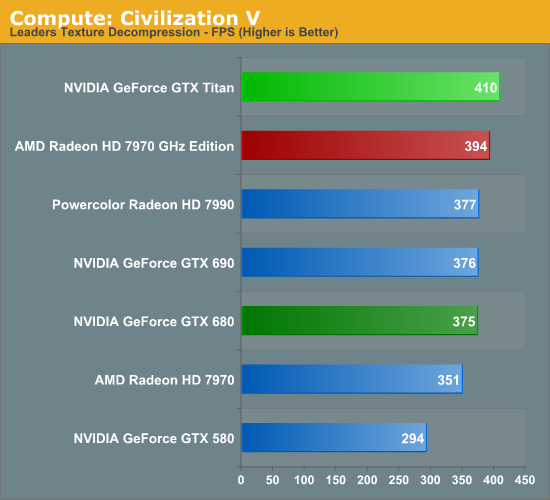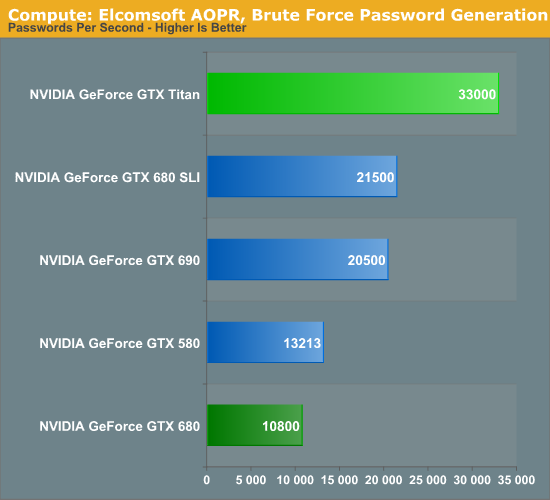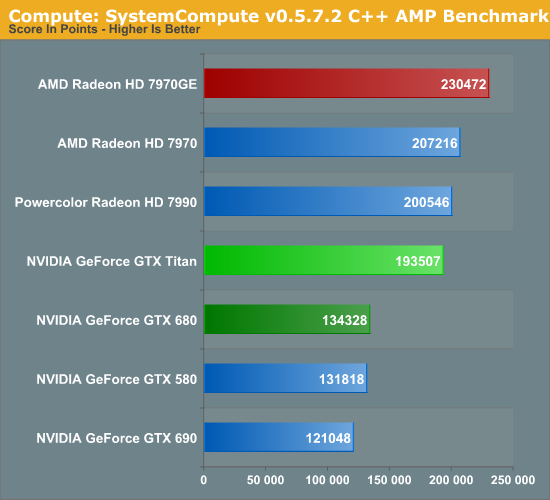NVIDIA’s GeForce GTX Titan Review, Part 2: Titan's Performance Unveiled
by Ryan Smith & Rahul Garg on February 21, 2013 9:00 AM ESTTitan’s Compute Performance, Cont
With Rahul having covered the basis of Titan’s strong compute performance, let’s shift gears a bit and take a look at real world usage.
On top of Rahul’s work with Titan, as part of our 2013 GPU benchmark suite we put together a larger number of compute benchmarks to try to cover real world usage, including the old standards of gaming usage (Civilization V) and ray tracing (LuxMark), along with several new tests. Unfortunately that got cut short when we discovered that OpenCL support is currently broken in the press drivers, which prevents us from using several of our tests. We still have our CUDA and DirectCompute benchmarks to look at, but a full look at Titan’s compute performance on our 2013 GPU benchmark suite will have to wait for another day.
For their part, NVIDIA of course already has OpenCL working on GK110 with Tesla. The issue is that somewhere between that and bringing up GK110 for Titan by integrating it into NVIDIA’s mainline GeForce drivers – specifically the new R314 branch – OpenCL support was broken. As a result we expect this will be fixed in short order, but it’s not something NVIDIA checked for ahead of the press launch of Titan, and it’s not something they could fix in time for today’s article.
Unfortunately this means that comparisons with Tahiti will be few and far between for now. Most significant cross-platform compute programs are OpenCL based rather than DirectCompute, so short of games and a couple other cases such as Ian’s C++ AMP benchmark, we don’t have too many cross-platform benchmarks to look at. With that out of the way, let’s dive into our condensed collection of compute benchmarks.
We’ll once more start with our DirectCompute game example, Civilization V, which uses DirectCompute to decompress textures on the fly. Civ V includes a sub-benchmark that exclusively tests the speed of their texture decompression algorithm by repeatedly decompressing the textures required for one of the game’s leader scenes. While DirectCompute is used in many games, this is one of the only games with a benchmark that can isolate the use of DirectCompute and its resulting performance.
Note that for 2013 we have changed the benchmark a bit, moving from using a single leader to using all of the leaders. As a result the reported numbers are higher, but they’re also not going to be comparable with this benchmark’s use from our 2012 datasets.

With Civilization V having launched in 2010, graphics cards have become significantly more powerful since then, far outpacing growth in the CPUs that feed them. As a result we’ve rather quickly drifted from being GPU bottlenecked to being CPU bottlenecked, as we see both in our Civ V game benchmarks and our DirectCompute benchmarks. For high-end GPUs the performance difference is rather minor; the gap between GTX 680 and Titan for example is 45fps, or just less than 10%. Still, it’s at least enough to get Titan past the 7970GE in this case.
Our second test is one of our new tests, utilizing Elcomsoft’s Advanced Office Password Recovery utility to take a look at GPU password generation. AOPR has separate CUDA and OpenCL kernels for NVIDIA and AMD cards respectively, which means it doesn’t follow the same code path on all GPUs but it is using an optimal path for each GPU it can handle. Unfortunately we’re having trouble getting it to recognize AMD 7900 series cards in this build, so we only have CUDA cards for the time being.

Password generation and other forms of brute force crypto is an area where the GTX 680 is particularly weak, thanks to the various compute aspects that have been stripped out in the name of efficiency. As a result it ends up below even the GTX 580 in these benchmarks, never mind AMD’s GCN cards. But with Titan/GK110 offering NVIDIA’s full compute performance, it rips through this task. In fact it more than doubles performance from both the GTX 680 and the GTX 580, indicating that the huge performance gains we’re seeing are coming from not just the additional function units, but from architectural optimizations and new instructions that improve overall efficiency and reduce the number of cycles needed to complete work on a password.
Altogether at 33K passwords/second Titan is not just faster than GTX 680, but it’s faster than GTX 690 and GTX 680 SLI, making this a test where one big GPU (and its full compute performance) is better than two smaller GPUs. It will be interesting to see where the 7970 GHz Edition and other Tahiti cards place in this test once we can get them up and running.
Our final test in our abbreviated compute benchmark suite is our very own Dr. Ian Cutress’s SystemCompute benchmark, which is a collection of several different fundamental compute algorithms. Rahul went into greater detail on this back in his look at Titan’s compute performance, but I wanted to go over it again quickly with the full lineup of cards we’ve tested.

Surprisingly, for all of its performance gains relative to GTX 680, Titan still falls notably behind the 7970GE here. Given Titan’s theoretical performance and the fundamental nature of this test we would have expected it to do better. But without additional cross-platform tests it’s hard to say whether this is something where AMD’s GCN architecture continues to shine over Kepler, or if perhaps it’s a weakness in NVIDIA’s current DirectCompute implementation for GK110. Time will tell on this one, but in the meantime this is the first solid sign that Tahiti may be more of a match for GK110 than it’s typically given credit for.










337 Comments
View All Comments
ponderous - Thursday, February 21, 2013 - link
Cannot give kudos to what is a well performing card when it is so grosslyout of order in price for the performance. $1000 card for 35% more performance
than the $450 GTX680. A $1000 card that is 20% slower than the $1000 GTX690.
And a $1000 card that is 30% slower than a $900 GTX680SLI solution.
Meet the 'Titan'(aka over-priced GTX680).
Well here we have it, the 'real' GTX680 with a special name and a 'special'
price. Nvidia just trolled us with this card. It was not enough for them to
sell a mid-ranged card for $500 as the 'GTX680', now we have 'Titan' for twice
the price and an unremarkable performance level from the obvious genuine successor
to GF110(GTX580).
At this irrational price, this 'Titanic' amusement park ride is not one worth
standing in line to buy a ticket for, before it inevitably sinks,
along with its price.
wreckeysroll - Thursday, February 21, 2013 - link
now there is some good fps numbers for titan. we expected to see such. shocked to see it with the same performance as 7970ghz in that test although!much too much retail msrp for the card. unclear what nvidia was thinking. msrp is sitting far too high for this unfortunately
quantumsills - Thursday, February 21, 2013 - link
Wow....Some respectable performance turn-out here. The compute functionality is formidable, albeit the value of such is questionable in what is a consumer gaming card.
A g-note though ? Really nvidia ? At what degree of inebriation was the conclusion drawn that this justifies a thousand dollar price tag ?
Signed
Flabbergasted.
RussianSensation - Thursday, February 21, 2013 - link
Compute functionality is nothing special. Still can't bitcoin mine well, sucks at OpenCL (http://www.computerbase.de/artikel/grafikkarten/20... and if you need double precision, well a $500 Asus Matrix Platinum @ 1300mhz gives you 1.33 Tflops. You really need to know specific apps you are going to run on this like Adobe CS6 or very specific CUDA compute programs to make it worthwhile as a non-gaming card.JarredWalton - Thursday, February 21, 2013 - link
Really? People are going to trot out Bitcoin still? I realize AMD does well there, but if you're serious about BTC you'd be looking at FPGAs or trying your luck at getting one of the ASICs. I hear those are supposed to be shipping in quantity some time soon, at which point I suspect prices of BTC will plummet as the early ASIC owners cash out to pay for more hardware.RussianSensation - Thursday, February 28, 2013 - link
It's not about bitcoin mining alone. What specific compute programs outside of scientific research does the Titan excel at? It fails at OpenCL, what about ray-tracing in Luxmark? Let's compare its performance in many double precision distributed computing projects (MilkyWay@Home, CollatzConjecture), run it through DirectCompute benches, etc.http://www.computerbase.de/artikel/grafikkarten/20...
So far in this review covers the Titan's performance from specific scientific work done by universities. But those types of researchers get grants to buy full-fledged Tesla cards. The compute analysis in the review is too brief to conclude that it's the best compute card. Even the Elcomsoft password hashing - well AMD cards perform faster there too but they weren't tested. My point is it's not true to say this card is unmatched in compute. It's only true in specific apps. Also, leaving full double precision compute doesn't justify its price tag either since AMD cards have had non-gimped DP for 5+ years now.
maxcellerate - Thursday, March 28, 2013 - link
I tend to argee with RussianSensation, though the fact is that the first batch of Titans has sold out. But to who? There will be the odd mad gamer who must have the latest most expensive card in their rig, regardless. But I suspect the majority of sales have gone to CG renderers where CUDA still rules and $1000 for this card is a bargain compared to what they would have paid for it as a Quadra. Once sales to that market have dried up, the price will drop.Then I can have one;)
ponderous - Thursday, February 21, 2013 - link
True. Very disappointing card. Not enough performance for the exorbitant cost.Nvidia made a fumble here on the cost. Will be interesting to watch in the coming months where the sure to come price drops wind up placing the actual value of this card at.
CeriseCogburn - Saturday, February 23, 2013 - link
LOL - now compute doesn't matter - thank you RS for the 180 degree flip flop, right on schedule...RussianSensation - Thursday, February 28, 2013 - link
I never said compute doesn't matter. I said the Titan's "out of this world compute performance" needs to be better substantiated. Compute covers a lot of apps, bitcoin, openCL, distributed computing projects. None of these are mentioned.